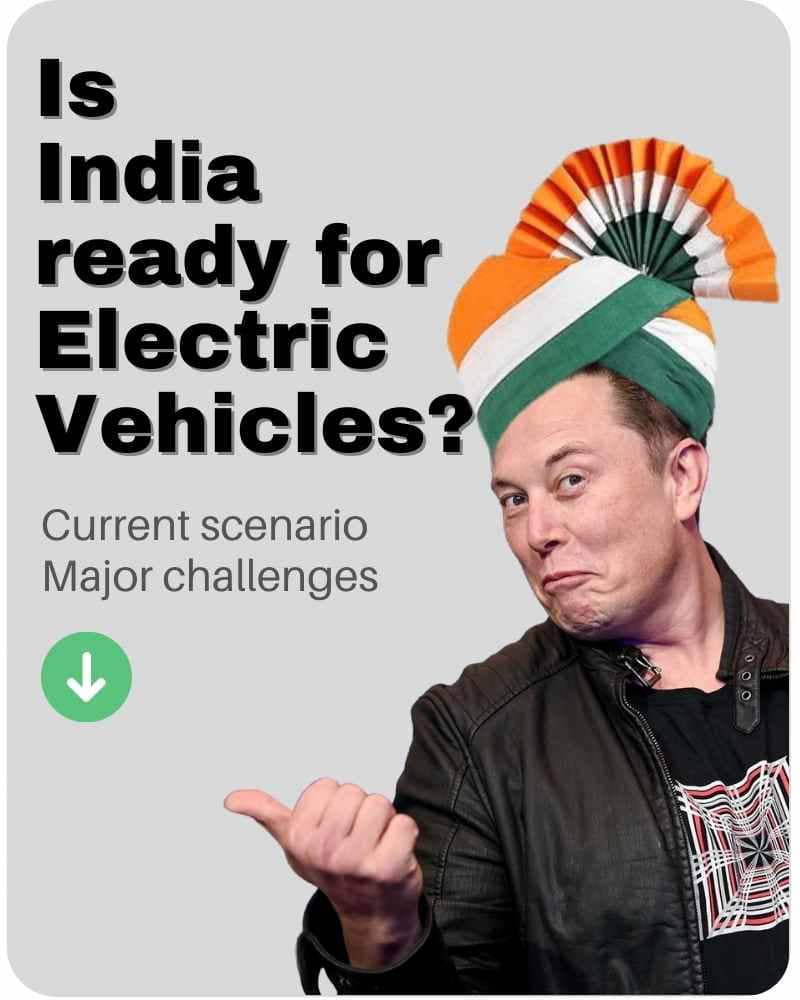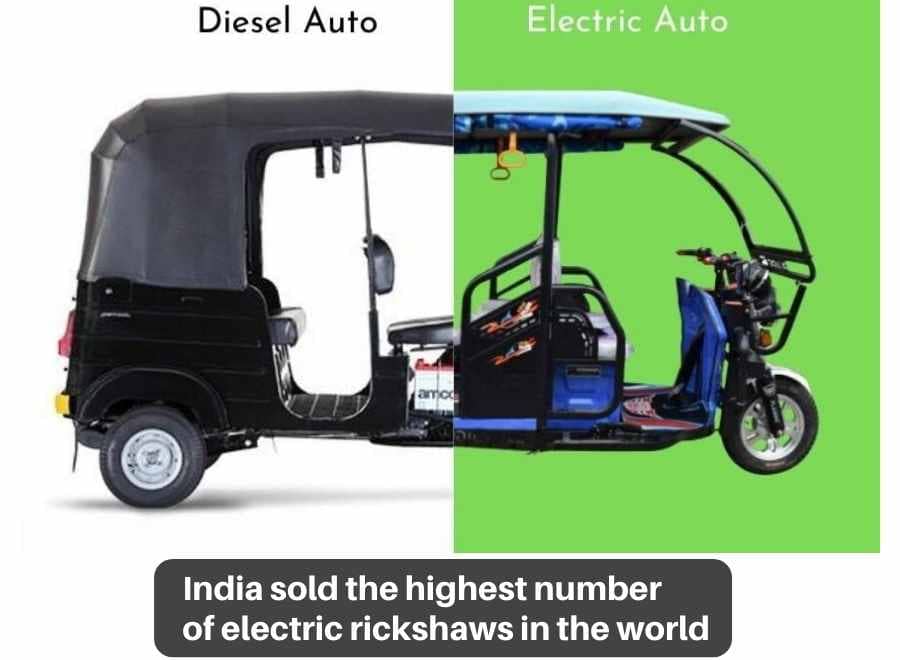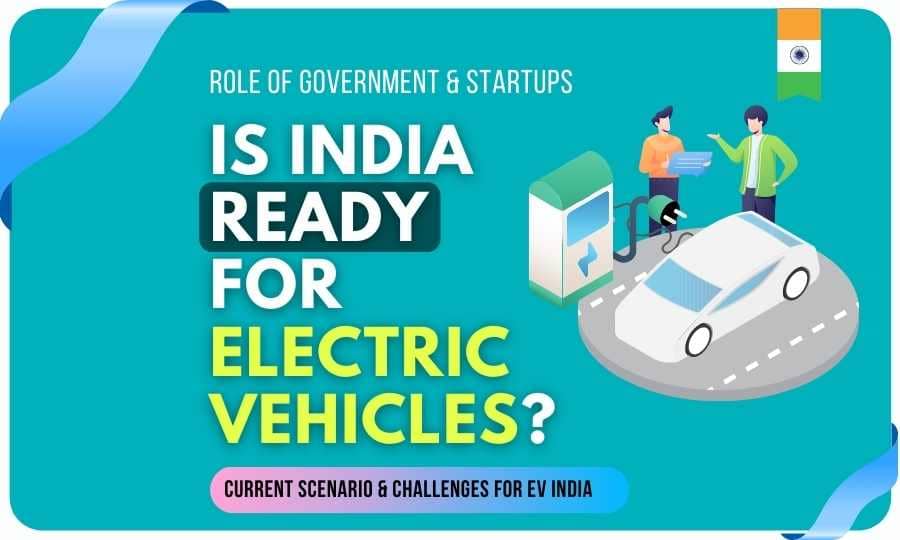- Yes, India is ready for electric vehicles despite some challenges which are being tackled.
- Both infrastructure and mindset towards EV are changing in India.
- The launch of Elon Musk’s Tesla in India is the beginning of a new era.
Global transportation is going electric on a rapid scale, so is the scenario of electric vehicles in India. The electric vehicle industry is expected to replace the use of non-renewable fossil fuels and ICE vehicles in the near future. After the deployment of more than 20 Million electric vehicles Globally as per the target set by the Electric Vehicle Initiative (EVI), India too is joining the movement with the major automobile giants and startups launching their first generation of electric vehicles. The question is – is India ready for electric vehicles?
Indians have shown a great interest in the shift of mobility pattern, which was the need of the hour considering the alarming pollution levels in India. This interest was seen with the increase in the sale of electric vehicles post lockdown and is expected to cross over 100 million by 2030.
The Indian Government has taken on an ambitious goal of making 30% of vehicles in India electric by 2030. Which is quite a challenging task considering the population of the country exceeding 1.4 Billion and the major liked and economic way of mobility still being the traditional ICE cars in India.
READ MORE : Future of electric vehicles in India
Tesla’s launch in the Indian market has boosted the interest of millennials and youth towards green mobility. But at the same time, there are some challenges in the widespread adoption of EVs in India.

Considering which there is a big confusion among many – Is India ready for electric vehicles? Or Is India ready to switch to electric vehicles? Let’s find that below
Yes India is ready to switch over to electric vehicles
Yes, India is ready for electric vehicles. Considering the interest of the Government and major automobile giants towards the R&D and launch of electric vehicles in India. India can save up to 70 Billion on oil imports after switching over to EVs, 87% of India’s automotive fuel is imported from other countries.
The switch to electric vehicles in India is happening at a rapid place with recent policies and schemes from the government like FAME II and the National electric mobility mission. By 2023 the government wants all 3-wheelers to go electric (Government cars in India), this rule is expected to expand to most 2-wheelers by 2025.
Gone are the days of mentioning EVs being challenged by poor R&D and lack of charging infrastructure. India, as of now with several policies in place (FAME II & NEMMP) for the proper deployment of electric vehicles and charging stations has geared up pretty much towards sustainable mobility.
The early adoption of electric vehicles in the Indian market was seen with the rise of electric trains and electric rickshaws. India became the country with the highest sale of electric rickshaws during 2016 – 2020, and soon it is expected to set records in the two-wheeler segment. The micro-mobility sector has aided much in the development of the EV ecosystem and electric mobility in India with the replacement of fossil-fueled rickshaws with electric TOTO’s.

- Though not properly, but the infrastructure and mindset are changing with the hands-on involvement of the government and the major automobile giants from India. This change could be observed with the increase in sales of electric vehicles in India post lockdown and boost in electric mobility.
- The alarming pollution levels of the country demand the same shift from the traditional ways of mobility to greener and cleaner transportation. India currently is the most polluted country in the world with the level of emission being 7 times higher than the limit set by the World Health Organisation. 11 out of 13 most polluted cities globally are in India, and the capital of the country Delhi being in the top of the list with pollution levels 5 times higher than WHO safety limit.
- This horrifying level of air pollution is enough to cause several dangerous diseases in humans and other living creatures. Results of which India is constrained to bring down its average global share of vehicular pollution levels by 2030. So it’s high time for us to be aware of the changes that the government is planning and be ready for the switch to sustainable ways of mobility.
- By the adoption of electric vehicles in India, the nation can save up to ₹8 lakh crores on oil imports by 2035. As 87% of the country’s automotive fuel is imported from other countries. Several reports state that switching over to EVs and indigenous manufacturing of electric vehicles can increase the GDP in India to 27% by 2030.
- The government of India is pushing hard for the shift of mobility patterns in India. It came up with several initiatives and schemes such as the Launch of the National E-Mobility Programme with the target of bringing in 20,000 EVs to the Indian market by 2021. The government of India wants 60% of commercial vehicles, and 40% of privately owned cars to go electric by the end of 2030. Many state governments along with Delhi, Mumbai, and Kolkata have launched their own EV policies.
- The government of India has undertaken multiple initiatives to promote the manufacturing and adoption of electric vehicles in India with the release of FAME II (faster adoption and manufacture of electric vehicles) and the National electric mobility mission.
- Many state government’s transport departments have already started the shift to electric public transportation with the mass deployment of electric buses from the major electric bus manufacturers of the country. With the help of Ashok Leyland and BYD, the state transport departments plan to deploy 5500 electric buses by 2030 in some major metros.
- GOI offered 1120 Cr to TATA Motors Ltd for manufacturing 10,000 electric cars in India with the initiative of electrifying government vehicles. This huge project for the manufacture of electric vehicles is indicative of the growth of electric cars and the EV market in India.
- The government of India has delicensed electric vehicle charging stations in India, which is a major relief from the hassle of documentation and registration. Along with that under FAME II (faster adoption and manufacture of electric vehicles), huge subsidies are given in the purchase of charging station components.
Considering the Current scenario : INSTALL AN ELECTRIC VEHICLE CHARGING STATION
- In an agreement with major petrol pump companies, GOI aims to install one EV charging point in every fuel station across the country with the aim of securing the future of electric vehicles in India.
- The EV sector is booming up lately in India on a very massive scale with the hands-on involvement of major automobile manufacturers from India.
- Recent electric car launches from Tata Motors and Mahindra & Mahindra indicate the shift from ICE to modern electric vehicles in India and the rise of electric vehicle companies in India.
- A great number of electric vehicle startups from India like Ather energies, Okinawa electric, and many more are adding to the R&D in the EV sector in India. The launch of high-end electric two wheelers can be seen from multiple startups.
- The battery being the major component of EV, comes with a hefty price tag if imported. This overall increases the electric car price in India. Automotive giants and startups are playing a major role in the development of Indigenous Lithium-Ion batteries under the initiative of the Make in India Scheme, in order to lower the initial cost of owning an electric vehicle in India. The list of electric vehicle battery manufacturers in India is very small compared to other countries.
ISRO designed batteries are highly efficient which the Government decided to transfer the technology to manufacture batteries for the electric vehicle sector under licensed production.
Role of ISRO in future of EVs in India.
- With the ongoing rollout of electric vehicles by major EV giants in India, many electric vehicle startups have joined the race for sustainable mobility. These startups from India are developing highly advanced vehicles for Indian road conditions. Tie-ups with leading battery manufacturers around the globe resulted in the exchange of technologies to meet global battery standards and safety guidelines.
- The launch of the global EV giant Tesla marked a new era in the history of electric vehicles in India. The interest of youths towards EV culture has skyrocketed with the launch of Tesla, coming from a dynamic and inspiring CEO, Elon Musk. The launch of tesla is a big push for making India a major hub for the manufacture of electric vehicles.
Seeing the above-mentioned advancements within a very short span of time, it can be said that India is ready for electric vehicles as well as to tackle the challenges during the adoption of alternative ways of mobility.
The Problem
As we know, Any change is hard in the beginning and harder in the middle. The same is the case with electric vehicles in India, which brought some challenges along with it prior to their widespread adoption.
The question is still the same with a slightly different answer this time – Is India ready for electric vehicles?
Currently, electric vehicles constitute around 0.07 percent of the country’s total automotive sector, which is quite less compared to other nations.
- The initial cost of ownership of electric vehicles can be a big turnoff for India, as currently major components of EVs are imported from other countries which adds to its overall cost. The minimum cost of an electric car in India is around 10 lacs which is quite high for the Indian middle-class majority. Also, the lack of choice for an affordable option can be a challenge for Indian consumers.
- The uneven electricity distribution in the country needs to be tackled before the launch of electric cars in India. There are places that are yet to get an electricity connection and many face constant power fluctuations.
- The term quite often associated with electric vehicles in India is the lack of proper charging infrastructure & EV charging facilities. This is quite true, but the scenario is changing rapidly with the government schemes and incentives for installing EV charging stations. India added 15000 new charging stations to its charging infrastructure in 2020.
- Battery performance and manufacture are key challenges for EV growth in India. The available models provide a limited range and higher charging time. This adds to the range anxiety in consumers for driving an electric car. Lack of Lithium reserves adds to the higher cost of importing and price of electric vehicles in India, as Lithium is the major component of modern electric vehicle batteries.
- It is really hard to find a trained person for the repair and maintenance of EVs, as EV technology is quite new to them. Having very advanced technology in the vehicle it is almost impossible and risky to repair in local service centers.
- Lastly, a sudden change in the mobility pattern can affect the prevalent automotive sector dangerously which currently contributes almost 8% of the country’s GDP.
Ecogear’s take on – Is India ready for electric vehicles?
The rise in population increases the demand for energy supply, which can be tackled with the adoption of electric vehicles along with the generation of employment.
Despite the challenges for electric vehicles, India continues to flourish in the EV sector and is ready for the change from the traditional ICE to sustainable green vehicles. Efforts of the government and automobile giants cannot be overlooked for making India EV ready.
Considering the size of the nation, these challenges can be the pillars for the establishment of a highly advanced and largest electric ecosystem in India.
India being the fourth largest Automotive manufacturer in the world has the potential of becoming major hub for EV production with sales expected up to 100 million by 2020.
There are already a lot of electric cars in India from leading automobile manufacturers like Tata Nexon from Tata Motors, eVerito from Mahindra & Mahindra electric, and many more.
Yes, India is ready for Tesla, the major problem of charging infrastructure is almost resolved as India added almost 3000 charging station last year in 2020 across India.
Top electric vehicle shares are from leading automotive giants in India like Tata Motors, Mahindra & Mahindra, Hero Motorcorp, and Maruti Suzuki
The ever-growing problem of pollution in India and the potential saving of 70 Billion on oil imports majorly inspired India to move towards electric vehicles.
Some major challenges for the electric vehicles in the EV market in India are poor charging infrastructure, the higher initial cost of owning, poor battery performance, and range anxiety.
Any big change will face issue at the beginning, same is the case with electric vehicles. There are some challenges like range anxiety, awareness, inadequate charging infrastructure which are being tackled.
